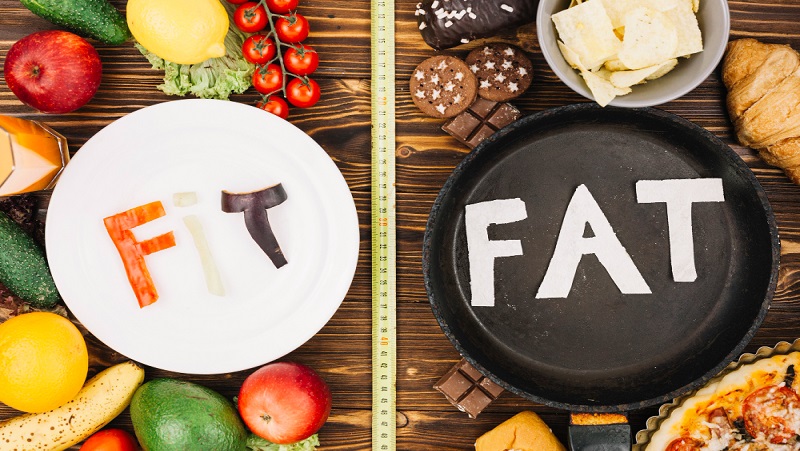Can nuts make us fat? Should we switch to skimmed milk to lose weight? Does “light” salad dressing have more benefits than regular dressing? When on a weight loss spree – or when trying to make healthy food choices – we often feel that low-fat food is healthier than full fat. However, the answer to this question is not as simple as we think and there’s no one-size-fits-all answer. A multitude of factors come into play that range from an individual’s genetics, existing health conditions, taste preferences, dietary adherence, and the nature of the food.
In this blog, we’ll explore the world of fats to help you make the right choices for your health.
Understanding Fat: The Good and the Bad
Before diving deep into the low-fat vs. full-fat showdown, it’s essential to understand the role of fat in our diet. Not all fats are created equal, and distinguishing the good ones from the bad ones is key. Essentially, there are two types of fats:
- Saturated Fat: Typically found in animal-based products such as red meat, butter, and cheese. Saturated fats are the “unhealthy” fats and have long been associated with an increased risk of heart disease. Reducing saturated fat intake should be you common dietary goal.
- Unsaturated Fat: These are considered the “healthy” fats. Unsaturated fats include monounsaturated fats (found in olive oil, avocados, and nuts) and polyunsaturated fats (found in fatty fish, flaxseeds, and walnuts). These fats can promote heart health, reduce inflammation, and support brain function.
Is Eating Low-Fat Food the Right Approach to Lose Weight?
Low-fat diets gained immense popularity in the late 20th century when they were believed to be the holy grail of health and weight management. Advocates for low-fat diets argue that:
- Lower fat intake can help reduce calorie consumption, thus aiding in weight loss or maintenance.
- Low-fat diets lower the risk of heart disease, particularly if they are low in saturated fats.
- Limited fat intake can contribute to lower LDL (bad) cholesterol levels, further supporting heart health.
However, in recent years, the reputation of full-fat foods has been rehabilitated, and they are no longer seen as the dietary villains they once were. The proponents of full-fat foods argue that:
- Fats are satiating, and full-fat foods can help control hunger and reduce overall calorie intake.
- Certain fat-soluble vitamins (A, D, E, and K) require fat for absorption, making full-fat foods important for nutrient absorption.
- Numerous research indicate that moderate consumption of certain full-fat foods may not increase the risk of heart disease and might even be protective.
Navigating the Nutritional Maze: Which Food is Better for Your Health & Weight?
The low-fat vs. full-fat debate often overshadows a critical aspect of nutrition: the quality of the foods we consume. Whether you choose low-fat or full-fat options, the emphasis should be on food quality and overall dietary patterns. So before adopting a food habit, carefully evaluate:
1.The Pitfalls of Low-Fat Alternatives
One of the primary concerns with low-fat foods is understanding what is substituted for the fat content. In many instances, these foods are loaded with carbohydrates and often sacrifice essential nutrients like fiber, protein, and amino acids. This can disrupt the overall nutritional balance – something that’s not in the best interest of one’s health.
Thus, to make an informed health choice, focus on three critical aspects: calories, carbohydrates, and protein and consult a certified nutritionist to strike the right balance between them.
2. The Hazards of Low-Fat Food
As mentioned above, the term “low-fat” is often synonymous with “high-carb.” For example, consider your 100-calorie, low-fat diet. Though marketed as a weight-loss product, these bars are essentially 100% carbohydrates and are often as unhealthy as your cookies. Consuming these low-fat, high-carb foods can lead to elevated triglyceride levels, placing them on par with high-fat diets.
Also, regardless of whether you opt for a low-fat or a high-fat diet, it is crucial to maintain an adequate intake of protein. Inadequate protein consumption may lead to increased feelings of hunger, potentially resulting in excessive snacking.
3. The Health Benefits of Good Fats
Health experts unanimously emphasize the importance of incorporating healthy fats into one’s diet. Foods rich in beneficial fats, such as avocados, nuts, seeds, olive oil, and salmon, are highly recommended. These sources not only provide an abundance of heart-healthy fats but also contain lower levels of saturated fats, which can be detrimental to health.
4. The Satisfaction Factor
Selecting full-fat options, such as salad dressings, cheese, avocados, or nut butter in moderation, can lead to an enhanced sense of fullness. A diet rich in protein and healthy fats is conducive to satiety. These nutrients are slow to digest and leave you feeling full and satisfied for an extended time. In contrast, a low-fat meal may leave you craving more due to the absence of healthy fats.
How to Make a Wise Choice?
For sustainable weight management and overall well-being, it is important to strike the right nutritional balance. Opt for a diet that’s rich in plant-based foods – fruits, vegetables, and legumes. Complement them with healthy fats, and lean proteins. This holistic approach ensures a well-rounded diet that ensures effective weight loss.
- Focus on Whole Foods: Opt for natural, whole foods such as fruits, vegetables, lean proteins, and whole grains.
- Be Mindful of Added Sugars: Some low-fat products compensate for flavor by adding sugars, which can be counterproductive.
- Read Labels: Check food labels for hidden sources of unhealthy fats and excess calories.
- Ensure Portion Control: Regardless of fat content, watch your portion sizes to avoid overconsumption.
- Consult a Certified Nutritionist: When in doubt, it is always wise to consult an experienced nutritionist who can provide personalized guidance and recommendations tailored to your specific dietary needs and goals.
Remember, a balanced diet isn’t just about the fat content but the overall quality of the foods you consume. Prioritize whole, unprocessed foods, and be mindful of added sugars and hidden sources of unhealthy fats. Reading food labels can help you make informed choices. Additionally, practice portion control to prevent overeating, regardless of the fat content in your meals.
When you have questions or concerns about your diet, seeking the advice of a certified nutritionist like Dr. Lala at Kinetix is a smart move. A board-certified nutritionist, she can offer valuable insights and create a customized plan that aligns with your health objectives.
After all, the most nutritious diet is one that aligns with your lifestyle, supports your health, and brings you satisfaction.




